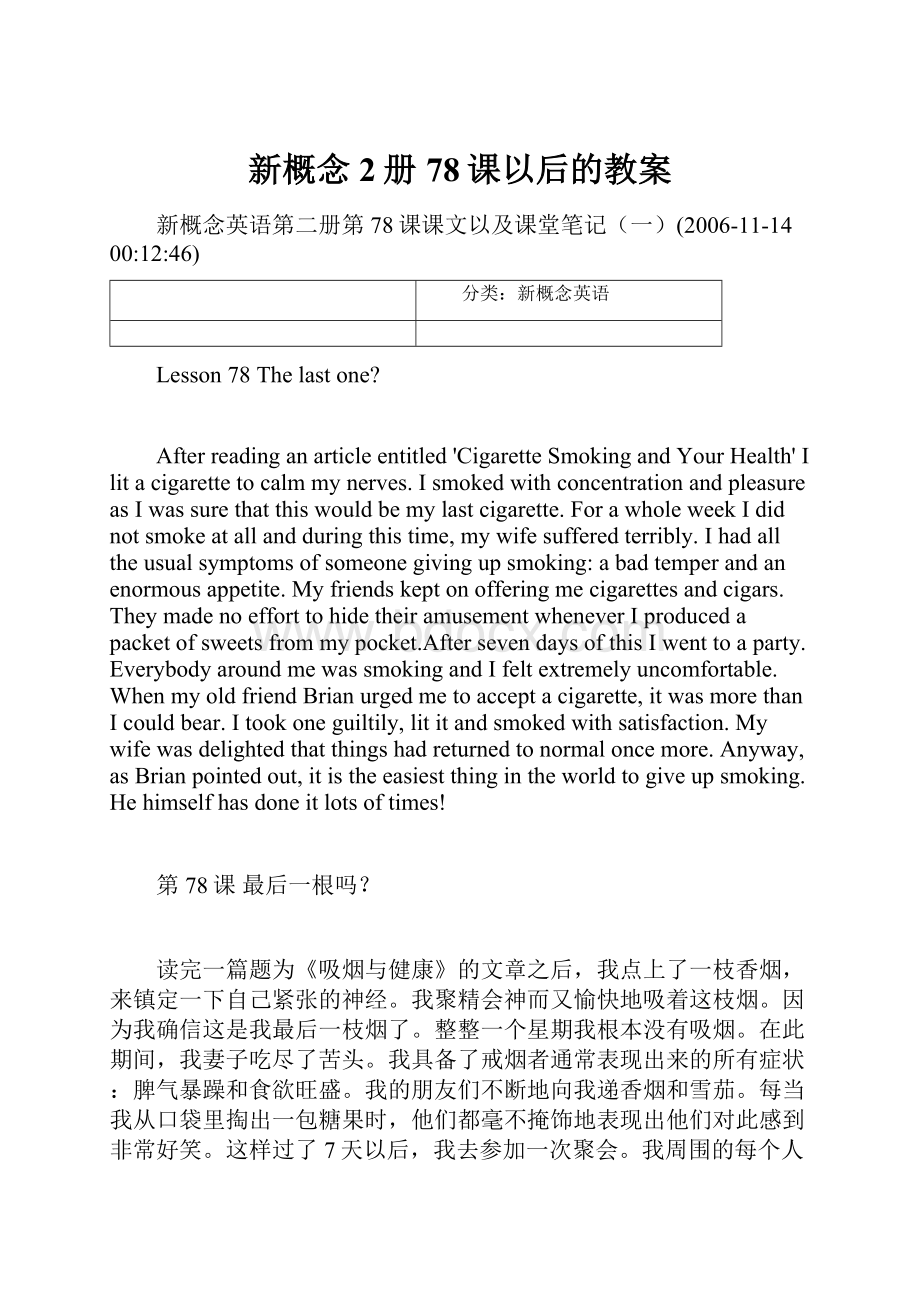新概念2册78课以后的教案.docx
《新概念2册78课以后的教案.docx》由会员分享,可在线阅读,更多相关《新概念2册78课以后的教案.docx(17页珍藏版)》请在冰豆网上搜索。

新概念2册78课以后的教案
新概念英语第二册第78课课文以及课堂笔记
(一)(2006-11-1400:
12:
46)
分类:
新概念英语
Lesson78Thelastone?
Afterreadinganarticleentitled'CigaretteSmokingandYourHealth'Ilitacigarettetocalmmynerves.IsmokedwithconcentrationandpleasureasIwassurethatthiswouldbemylastcigarette.ForawholeweekIdidnotsmokeatallandduringthistime,mywifesufferedterribly.Ihadalltheusualsymptomsofsomeonegivingupsmoking:
abadtemperandanenormousappetite.Myfriendskeptonofferingmecigarettesandcigars.TheymadenoefforttohidetheiramusementwheneverIproducedapacketofsweetsfrommypocket.AftersevendaysofthisIwenttoaparty.EverybodyaroundmewassmokingandIfeltextremelyuncomfortable.WhenmyoldfriendBrianurgedmetoacceptacigarette,itwasmorethanIcouldbear.Itookoneguiltily,lititandsmokedwithsatisfaction.Mywifewasdelightedthatthingshadreturnedtonormaloncemore.Anyway,asBrianpointedout,itistheeasiestthingintheworldtogiveupsmoking.Hehimselfhasdoneitlotsoftimes!
第78课最后一根吗?
读完一篇题为《吸烟与健康》的文章之后,我点上了一枝香烟,来镇定一下自己紧张的神经。
我聚精会神而又愉快地吸着这枝烟。
因为我确信这是我最后一枝烟了。
整整一个星期我根本没有吸烟。
在此期间,我妻子吃尽了苦头。
我具备了戒烟者通常表现出来的所有症状:
脾气暴躁和食欲旺盛。
我的朋友们不断地向我递香烟和雪茄。
每当我从口袋里掏出一包糖果时,他们都毫不掩饰地表现出他们对此感到非常好笑。
这样过了7天以后,我去参加一次聚会。
我周围的每个人都在吸烟,我感到非常不自在。
当我的老朋友布赖恩极力劝我接受一枝香烟时,我再也忍不住了。
我内疚地接过一枝点上,心满意足地抽起来。
一切又都恢复了正常,为此我妻子十分高兴。
不管怎么说,正如布赖恩指出的那样,戒烟是世界上最容易的事情,他自己就已戒了很多次了!
课堂笔记:
1)entitle
anarticleentitled‘CigaretteSmokingandYourHealth’,一篇题为《吸烟与健康》的文章。
在英语中,文章名与书名中的每个单词的第一个字母均大写,不在开头位置的连词、冠词、小品词除外。
entitle的含义为“给......题名/定名”,在这里是过去分词(短语)作定语。
entitle常用于被动语态:
Thewriterhasn'tentitledhisnewbookyet.
那位作家还没给他的新书写/取名。
Shereadapoementitled"TheAppleTree"
她读了一首题为《苹果树》的诗
entitlesbtosth给予某人获得某事物或做某事的权利
Youareentitledtocollecttherentalfeefromthecustomers.
你有权利去收取客户的房租。
Thisticketdoesn'tentitleyoutositinfirstclass.你这张票不能坐头等位。
entitlement授权,有资格
Wehavenorecordofyourentitlementtofreetravel.我们没有让你免费旅行的记录。
2)lit原形lightlitlit(lighted,ligthed)lightedcandel燃着的蜡烛
lightacandle
lightacigarette
lightup(withsth)指人的脸等放光彩,容光焕发
Hereyeslitupwithjoy.她因喜悦而目光炯炯
3)calmadj.镇定的,安静的,无忧虑的
Itisimportanttokeepcalminanemergency.在紧急情况下保持镇静是很重要的。
thecalmbeforethestorm暴风雨前的宁静
v.calm(sb)down使某人平静,镇静
Justcalmdownabit.你先静一静!
calmly若无其事地
Hewalkedintotheshopandcalmlystoleapairofgloves.他走进商店若无其事地偷了一副手套
4)nerves用复数表示神经紧张,神经过敏,神经质
Shedoesn'tknowwhatnervesare.她根本就不知道什么是神经紧张。
胆量,勇气
Ittakesnervetobearacingdriver.
当赛车手要有胆量
Iwouldn'thavethenervetotryanythingsodangerous.我可没胆量做那么危险的事情。
Whatanerve!
脸皮真厚(whatashame)
getonsb'snerves刺激或烦扰某人
Stopsinging!
Youaregettingonmynerves.别唱了!
弄得我心烦
hit/toucha(raw)nerve提及某人痛苦气愤等的事情,点到痛处
Youhitarawnervewhenyoumentionedhisfirstwife你曾提到他的前妻刺到了他的痛处。
5)concentrateonsth集中注意力做某事
6)sufferDuringthistime,mywifesufferedterribly.
在此期间,我妻子吃尽了苦头。
(1)vi.受痛苦,受苦难;患病:
sufferfrom/with/for
Doyouoftensufferfromheadaches?
你常头痛吗?
Sheissufferingfromlossofmemory。
她患有遗忘症
Hemadearashdecision.Nowheissufferingforit.他做的决定太草率了,现在可吃到苦头
(2)vt.经历或遭受(痛苦、损害等):
Manypeoplearesufferingcoldandhungerinthatdistrict.
那个地区许多人正受冻挨饿。
(3)变坏,变差,变糟
Yourstudieswillsufferifyouplaytoomuchfootball.你要是总踢足球,功课就会变糟了。
suffering痛苦(肉体的或心理的)
Thereissomuchsufferinginthisworld.这个世界上有很多的痛苦。
7)Ihadalltheusualsymptomsofsomeonegivingupsmoking:
abadtemperandanenormousappetite.我具备了戒烟者通常表现出来的所有症状:
脾气暴躁和食欲旺盛。
abadtemperandanenormousappetite为symptoms的同位语。
givingupsmoking可以看做是someone的定语,即someonewhogivesupsmoking.
symptom症状,(坏事的)征兆
Youhaveasymptomofcatchingacold你有患感冒的症状
enormous巨大的,极大的
anenormousamountofmoney巨款
appetite食欲,胃口
WhenIwasillIcompletelylostmyappetite.我生病时完全没有食欲
Hehasnoappetiteforthefight.他毫无斗志。
8)MyfriendsKeptonofferingmecigarettesandcigars.我的朋友们不断地向我递香烟和雪茄。
keepondoingsth.表示“继续做某事”、“反复做某事”:
Thechildwascryingloudly,buthekeptonwatchingTV.
孩子在大声哭,但他却一直看电视。
Hekeptonphoningme
他不断地给她打电话。
9)Theymadenoefforttohide他们毫不掩饰地。
。
。
makeefforttodosth尽力做某事
makenoeffort表示“根本不作努力”。
我们还可以说:
Hemadenoefforttotaketheexam.他考试根本不努力。
makeeveryeffort尽一切努力
Iwillmakeeveryefforttoarriveontime.我将尽一切努力准时到达。
Shewrotetheletterwith/withouteffort.
她费力地/毫不费力地写了那封信。
Georegmadeeveryefforttoget/atgettingthejob.
乔治竭尽全力想得到那份工作。
10)producesth(from/outofsth)掏出,拿出或出示某事物
Pleaseproduceyourticketforinspection.出示火车票以供检查
Themanproducedaknifefromhispocket.那男人从他口袋里掏出一把刀
第78课课堂笔记
(二)
11)urgeurgesbtodosth催促某人干某事。
力劝某人做某事
Theyurgedustogoatonce他们催促我们马上去。
极力主张,强烈要求,力劝
MyfriendsurgedthatIshouldapplyforthejob
朋友们力劝我申请那份工作。
HeurgedthattheygotoNewYork
他极力主张他们去纽约。
urgesb.on鼓励或激励某人,鞭策
Weurgedtheschoolteamonwithloudcheers.
我们大声助威,激励校队拼搏
强调 urgeon/uponsb 对某人/某事强调
Weurgedonyoutheimportanceofthetimefactor.我们曾向你方强调过时间因素的主要性。
n.
强烈的欲望,冲动
ThevacationiscomingandIhaveanurgetotravel.
假期快到了,我很急迫地去旅行。
冲动,强烈的欲望”。
IhadasuddenurgetotellthebosswhatIthoughtofhim.
我突然想告诉老板我对他的看法。
12)itwasmorethanIcouldbear....我再也忍不住了。
morethan后面跟一个从句或一个形容词时可以表示“超出”(多用于口语):
Hewasmorethanpleasedwithhisnewroom.
他对自己的新房间极其满意。
ThiswasmorethanIhadexpected.
这超出了我的预料。
13)guiltily内疚地
guiltyadj.
guiltyofsth.有罪的
Hewasfoundguiltyofmurder他被判犯谋杀罪。
有過失的[(+of)]
Themanagerwasguiltyofanimportantmisjudgment.
经理犯了一個重大的判断错误。
自知有過錯的,內疚的[(+about)]
Ifeltguiltyafterbreakingmypromise.
我违背诺言后感到内疚。
Youlookguilty.你看上去心虚。
guiltn有罪,罪状
Thepoliceestablishedhisguilt.警方认定他有罪。
guiltlessofsth无罪的,无辜的
14)delight
1.欣喜,愉快[U]
Toourdelight,ourfootballteamwon.
令我们高兴的是,我们的足球队贏了。
Sheranbackhomewithdelight.
她兴高采烈地跑回家。
2。
vt.1.使高兴,愉快
I'mdelightedthatyouareback.
你回來了,我很高兴。
Weweredelightedtoreadyournovel.
我们很高兴拜读你的小说。
Hersingingdelightedeveryone.
她的歌声使大家很愉快。
vi.delightinsth/doingsth
1.喜爱,取乐[(+in)]
Shedelightsinherwork.
她喜愛她的工作。
14)
Anyway,asBrianpointedout,itistheeasiestthingintheworldtogiveupsmoking.不管怎么说,正如布赖恩指出的那样,戒烟是世界上最容易的事情。
it为先行主语,代替后面的不定式短语togiveupsmoking。
pointout为固定短语,表示“指出”、“指明”:
Hepointedoutthemistaketome.
他向我指出错误。
Hepointedoutthatwestillhadtogetafewotherthings.
他指出我们还需要/得再买一些其他东西。
2.与keep有关的短语动词
keep与不同的小品词搭配可以有不同的含义。
(1)keepon与动名词连用时表示“反复”、“持续”:
Keepontrying.
继续努力。
Hekeptonsayingthathewastired.
他不断地说他累了。
(2)keepoff表示“不靠近”、“从......离开”:
Keepofftheflowerbed.
请勿进入花坛。
Keepyourhandsoffthefood.
别动吃的东西。
(3)keepawayfrom表示“(使.......)不靠近”、“避开”:
Whydoyoualwayskeepawayfromme?
你为什么总躲着我?
Keepthechildrenawayfromtheriver.
别让孩子们去河边。
(4)keepitup表示“不松劲”、“保持成绩”或“继续下去”,而
keepupwith则表示“跟上”、“不落在......后面”:
You'vemademuchprogress.Keepitup!
你已取得了很大进步。
继续努力!
Ifyoukeepitup,you'llbeabletosetupanewworldrecord.
你如果保持下去/不松劲,你就能创一项新的世界纪录。
Althoughhewalkedasfastashecould,hestillcouldn'tkeepupwithhis
father.
虽然他尽快走,但他仍跟不上他父亲。
Inordertokeepupwithhisclassmates,heworkedharderthanever.为了跟上同学,他比以往任何时候都更努力。
(5)keepout可以表示“(使)留在外面”、“(使)不进入”:
Heshutallthedoorsandwindowstokeepoutthewind.
为了挡风,他关上了所有的门窗。
16,000-voltpowerline.Keepout!
16,000伏高压线,不可靠近!
(6)keepin的含义之一为“(把.......)留在里面/关在屋里”、“不
出外”:
It'sverycoldtoday.We'dbetterkeepin.
今天很冷。
我们最好别出去。
Whenthedogwaskeptin,itbarkedloudly.
那条狗被关在屋里时狂吠不止。
(7)keepupwithsb保持与某人联系
Howmanyofyouroldclassmatesdoyoukeepupwith?
(8)keepsthbackfromsb向.......隐瞒某事
Iamsuresheiskeepingsomethingbackfromus我肯定她向我们隐瞒着什么
(9)keepinwithsb
Haveyounoticedhowhetriestokeepinwiththeboss?
你注意到他多巴结老板了吗?
Lesson79ByAir?
IusedtotravelbyairagreatdealwhenIwasaboy.MyparentsusedtoliveinSouthAmericaandIusedtoflytherefromEuropeintheholidays.AflightattendantwouldtakechargeofmeandIneverhadanunpleasantexperience.IamusedtotravelingbyairandonlyononeoccasionhaveIeverfeltfrightened.Aftertakingoff,wewereflyinglowoverthecityandslowlygainingheight,whentheplanesuddenlyturnedroundandflewbacktotheairport.Whilewewerewaitingtoland,aflightattendanttoldustokeepcalmandtogetofftheplanequietlyassoonasithadtoucheddown.Everybodyonboardwasworriedandwewerecurioustofindoutwhathadhappened.Laterwelearntthattherewasaveryimportantpersononboard.Thepolicehadbeentoldthatabombhadbeenplantedontheplane.Afterwehadlanded,theplanewassearchedthoroughly.Fortunately,nothingwasfoundandfivehourslaterwewereabletotakeoffagain.
第79课乘坐飞机?
我在幼年的时候,曾多次乘飞机旅行。
我的父母曾经住在南美洲,所以假期里我常从欧洲乘飞机到他们那里。
我总是由一位空中乘务员照管,从未遇到过不愉快的经历。
我习惯了乘飞机旅行,只是有一次把我吓坏了。
起飞之后,我们在城市上空低低地飞行,然后慢慢爬高。
这时飞机突然调转头来,飞回了机场。
在我们等待降落时,一位空中乘务员告诉我们要保持镇静,待飞机一着陆,就马上不声不响地离开飞机。
飞机上的人都很着急,大家都急于想知道究竟出了什么事。
后来我们才得知,飞机上坐了一位非常重要的人物。
有人报告警察,说飞机上安放了一枚炸弹。
我们降落之后,飞机被彻底搜查了一遍。
幸运的是,什么也没有找到。
5个小时后,我们又起飞了。
课堂笔记
(一)
1)usedtodo
我们用usedtodo表示过去有过但现在已不存在的习惯,以便将过去与现在形成对照。
它后面经常用由butnow...,butnot...anymore/anylonger等构成的、用了一般现在时的句子以强调过去和现在的不同之处。
Doyouwatchtelevision?
Iusedto,butIdon'tanylonger.
你看电视吗?
我过去常看,但现在不看了。
Iusedtosmoke,butIdon'tanymore/anylonger.我过去常吸烟,但现在已不吸了。
Heusedtobealazyboy,butnowheisveryhard-working.他过去是个懒孩子,但现在他很勤奋。
usedto仅用于一般过去时。
它的疑问句和否定句形式可以不用助动词do而用used本身:
Usedhetosmoke?
Heusedn't/usednottosmoke.
diddidn't
他过去吸烟吗?
他从前并不吸烟。
但比较常用的形式是did和didn't:
Didheusetosmoke?
Hedidn'tusetosmoke.
他过去吸烟吗?
他从前不吸烟。
在针对usedto提问时,一般也用did
Iusedtobeagoodswimmer.
Didyoureally?
Ididn'tevenknowyoucould